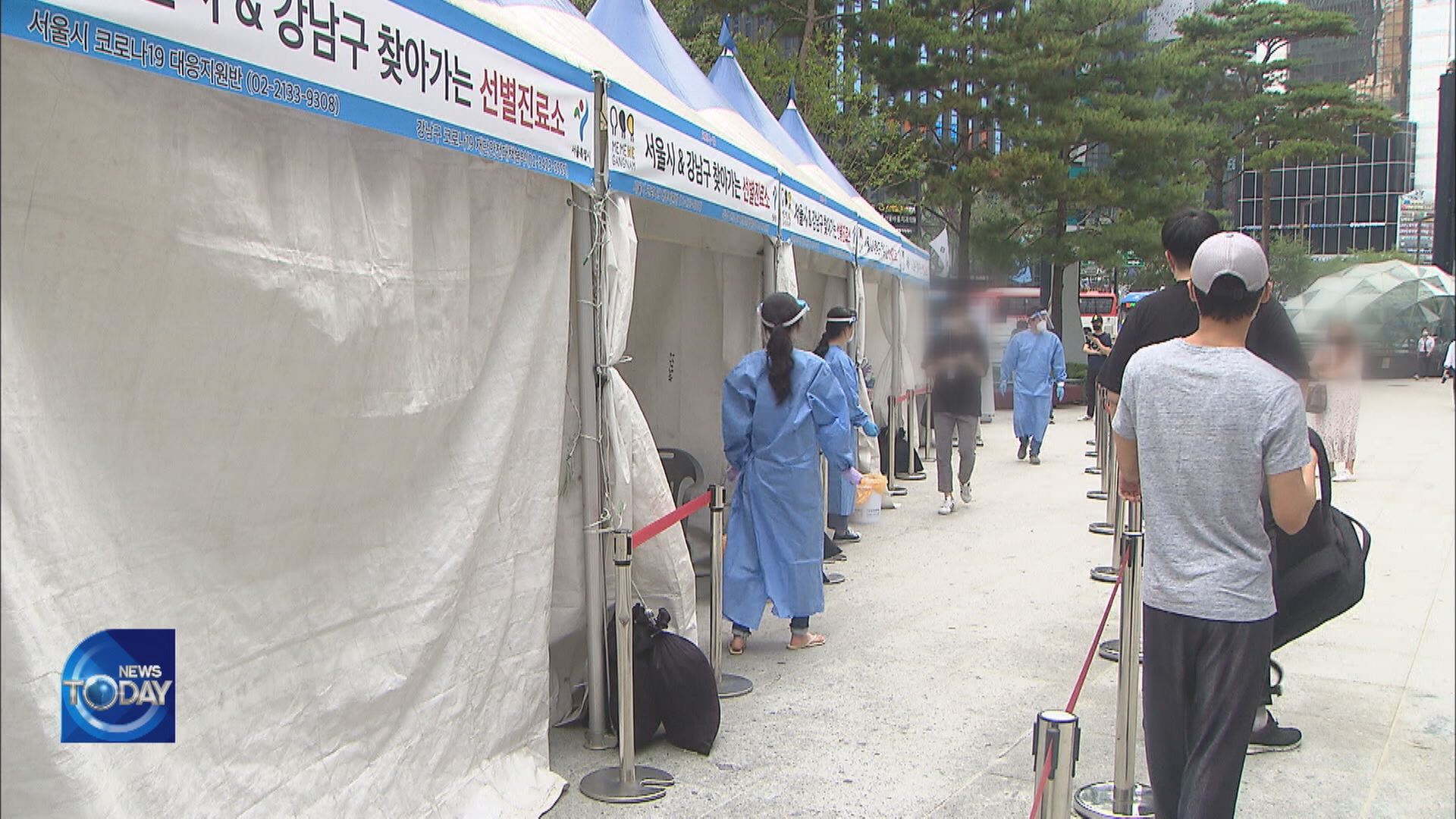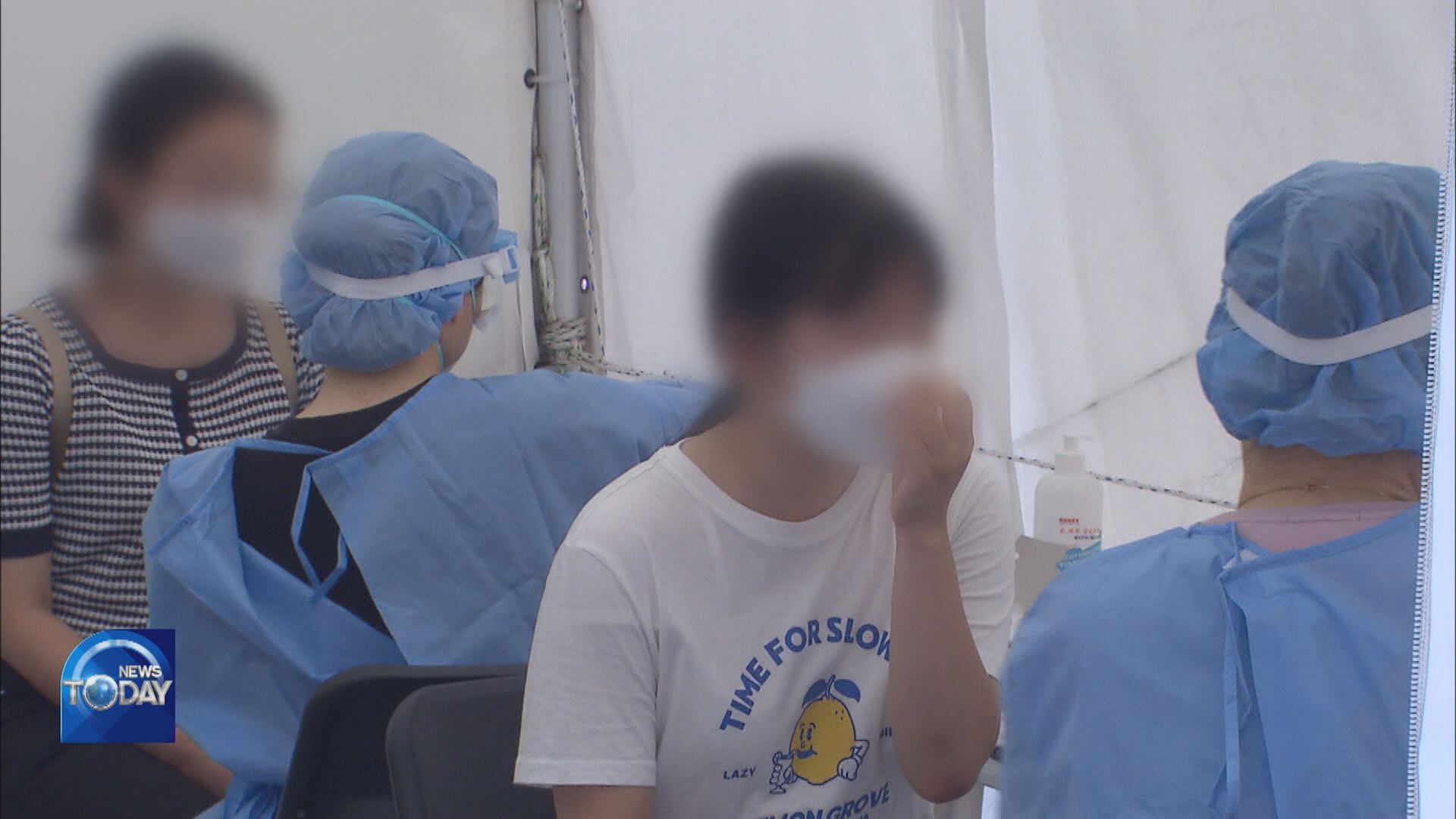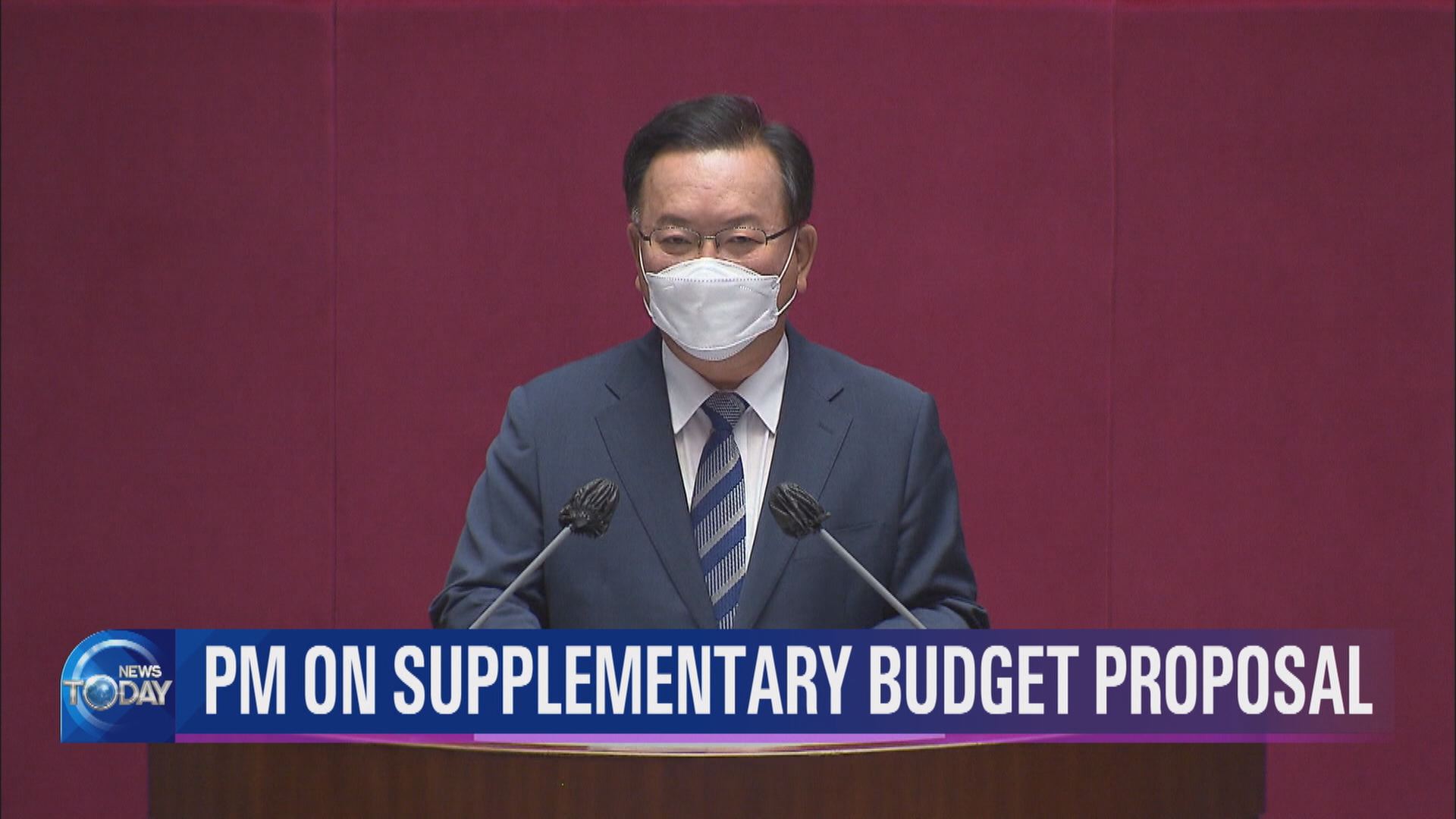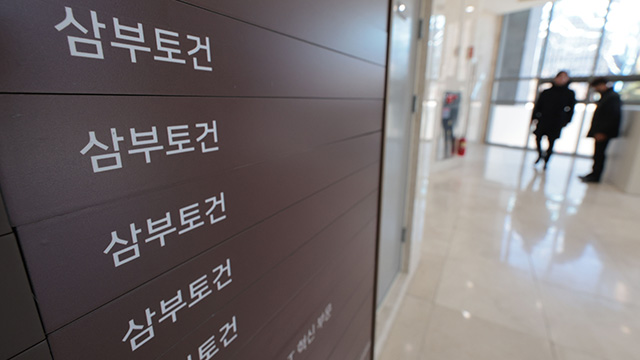GOV'T WARNS OF ANOTHER WAVE
입력 2021.07.08 (15:04)
수정 2021.07.08 (16:45)
읽어주기 기능은 크롬기반의
브라우저에서만 사용하실 수 있습니다.
[Anchor Lead]
South Korea has added more than 1200 new COVID-19 cases for the second straight day. Health authorities and experts are warning that this signals the beginning of another wave of infections. The latest surge is more worrying, as the more transmissible Delta variant is spreading at a high rate.
[Pkg]
In the greater capital area, new COVID-19 infections nearly doubled in a day. Experts stress this is not the peak of a passing surge, but possibly the start of the fourth wave.
[Soundbite] Paik Soon-young(Professor Emeritus, Medical College of Catholic Univ.) : "The fourth wave has already begun. These two months: July and August, are critical in battling and containing the surge."
The latest wave is more worrying than the previous three, since it is associated with the fast spread of a more transmissible variant. Currently, the Alpha type is dominant in South Korea. However, the Delta variant is rapidly gaining ground. Last month, the rate of Delta variant infections more than doubled from 5.8 percent to 12.7 percent in the greater capital area. Infections with the Delta variant are more obvious among younger adults. Recently, 17 percent of COVID-19 patients in their 20s were found to be infected with the Delta variant. An alarming hike from 1.8 percent in the second week of June. The number of Delta variant infections will be far greater than the detected cases. This is because of the small sample size: just 15 percent of overall patients are analyzed to trace the variant.
[Soundbite] Choi Won-suk(Korea University Ansan Hospital) : "The variant is predicted to spread further, as the nation has probably passed the phase when it can be controlled and responded with epidemiological investigations."
The number of critically ill patients is not increasing fast. But experts urge reviewing and adjusting medical capacities in preparation for a worst-case scenario of a prolonged fourth wave.
[Soundbite] Kim Tark(Soonchunhyang University Bucheon Hospital) : "It is necessary to re-count sickbeds for seriously ill patients and check the number of usable ones. It is also important to predict how the demand for sickbeds will change in two or four weeks."
They also stress the importance of continuing vaccinations as scheduled, as vaccine effects are not neutralized at all, even if the Delta variant becomes dominant.
South Korea has added more than 1200 new COVID-19 cases for the second straight day. Health authorities and experts are warning that this signals the beginning of another wave of infections. The latest surge is more worrying, as the more transmissible Delta variant is spreading at a high rate.
[Pkg]
In the greater capital area, new COVID-19 infections nearly doubled in a day. Experts stress this is not the peak of a passing surge, but possibly the start of the fourth wave.
[Soundbite] Paik Soon-young(Professor Emeritus, Medical College of Catholic Univ.) : "The fourth wave has already begun. These two months: July and August, are critical in battling and containing the surge."
The latest wave is more worrying than the previous three, since it is associated with the fast spread of a more transmissible variant. Currently, the Alpha type is dominant in South Korea. However, the Delta variant is rapidly gaining ground. Last month, the rate of Delta variant infections more than doubled from 5.8 percent to 12.7 percent in the greater capital area. Infections with the Delta variant are more obvious among younger adults. Recently, 17 percent of COVID-19 patients in their 20s were found to be infected with the Delta variant. An alarming hike from 1.8 percent in the second week of June. The number of Delta variant infections will be far greater than the detected cases. This is because of the small sample size: just 15 percent of overall patients are analyzed to trace the variant.
[Soundbite] Choi Won-suk(Korea University Ansan Hospital) : "The variant is predicted to spread further, as the nation has probably passed the phase when it can be controlled and responded with epidemiological investigations."
The number of critically ill patients is not increasing fast. But experts urge reviewing and adjusting medical capacities in preparation for a worst-case scenario of a prolonged fourth wave.
[Soundbite] Kim Tark(Soonchunhyang University Bucheon Hospital) : "It is necessary to re-count sickbeds for seriously ill patients and check the number of usable ones. It is also important to predict how the demand for sickbeds will change in two or four weeks."
They also stress the importance of continuing vaccinations as scheduled, as vaccine effects are not neutralized at all, even if the Delta variant becomes dominant.
■ 제보하기
▷ 카카오톡 : 'KBS제보' 검색, 채널 추가
▷ 전화 : 02-781-1234, 4444
▷ 이메일 : kbs1234@kbs.co.kr
▷ 유튜브, 네이버, 카카오에서도 KBS뉴스를 구독해주세요!
- GOV'T WARNS OF ANOTHER WAVE
-
- 입력 2021-07-08 15:04:21
- 수정2021-07-08 16:45:28

[Anchor Lead]
South Korea has added more than 1200 new COVID-19 cases for the second straight day. Health authorities and experts are warning that this signals the beginning of another wave of infections. The latest surge is more worrying, as the more transmissible Delta variant is spreading at a high rate.
[Pkg]
In the greater capital area, new COVID-19 infections nearly doubled in a day. Experts stress this is not the peak of a passing surge, but possibly the start of the fourth wave.
[Soundbite] Paik Soon-young(Professor Emeritus, Medical College of Catholic Univ.) : "The fourth wave has already begun. These two months: July and August, are critical in battling and containing the surge."
The latest wave is more worrying than the previous three, since it is associated with the fast spread of a more transmissible variant. Currently, the Alpha type is dominant in South Korea. However, the Delta variant is rapidly gaining ground. Last month, the rate of Delta variant infections more than doubled from 5.8 percent to 12.7 percent in the greater capital area. Infections with the Delta variant are more obvious among younger adults. Recently, 17 percent of COVID-19 patients in their 20s were found to be infected with the Delta variant. An alarming hike from 1.8 percent in the second week of June. The number of Delta variant infections will be far greater than the detected cases. This is because of the small sample size: just 15 percent of overall patients are analyzed to trace the variant.
[Soundbite] Choi Won-suk(Korea University Ansan Hospital) : "The variant is predicted to spread further, as the nation has probably passed the phase when it can be controlled and responded with epidemiological investigations."
The number of critically ill patients is not increasing fast. But experts urge reviewing and adjusting medical capacities in preparation for a worst-case scenario of a prolonged fourth wave.
[Soundbite] Kim Tark(Soonchunhyang University Bucheon Hospital) : "It is necessary to re-count sickbeds for seriously ill patients and check the number of usable ones. It is also important to predict how the demand for sickbeds will change in two or four weeks."
They also stress the importance of continuing vaccinations as scheduled, as vaccine effects are not neutralized at all, even if the Delta variant becomes dominant.
South Korea has added more than 1200 new COVID-19 cases for the second straight day. Health authorities and experts are warning that this signals the beginning of another wave of infections. The latest surge is more worrying, as the more transmissible Delta variant is spreading at a high rate.
[Pkg]
In the greater capital area, new COVID-19 infections nearly doubled in a day. Experts stress this is not the peak of a passing surge, but possibly the start of the fourth wave.
[Soundbite] Paik Soon-young(Professor Emeritus, Medical College of Catholic Univ.) : "The fourth wave has already begun. These two months: July and August, are critical in battling and containing the surge."
The latest wave is more worrying than the previous three, since it is associated with the fast spread of a more transmissible variant. Currently, the Alpha type is dominant in South Korea. However, the Delta variant is rapidly gaining ground. Last month, the rate of Delta variant infections more than doubled from 5.8 percent to 12.7 percent in the greater capital area. Infections with the Delta variant are more obvious among younger adults. Recently, 17 percent of COVID-19 patients in their 20s were found to be infected with the Delta variant. An alarming hike from 1.8 percent in the second week of June. The number of Delta variant infections will be far greater than the detected cases. This is because of the small sample size: just 15 percent of overall patients are analyzed to trace the variant.
[Soundbite] Choi Won-suk(Korea University Ansan Hospital) : "The variant is predicted to spread further, as the nation has probably passed the phase when it can be controlled and responded with epidemiological investigations."
The number of critically ill patients is not increasing fast. But experts urge reviewing and adjusting medical capacities in preparation for a worst-case scenario of a prolonged fourth wave.
[Soundbite] Kim Tark(Soonchunhyang University Bucheon Hospital) : "It is necessary to re-count sickbeds for seriously ill patients and check the number of usable ones. It is also important to predict how the demand for sickbeds will change in two or four weeks."
They also stress the importance of continuing vaccinations as scheduled, as vaccine effects are not neutralized at all, even if the Delta variant becomes dominant.
이 기사가 좋으셨다면
-
좋아요
0
-
응원해요
0
-
후속 원해요
0












![[뉴스특보 LIVE] 이재명 대통령, 취임 30일 기자회견](/data/layer/904/2025/07/20250703_dJHo27.jpg)
![[속보] 이 대통령 “3대 특검, 내란 종식·헌법 질서 재건 역할 기대”](/data/layer/904/2025/07/20250703_C7vKPb.png)
![[속보] 내란특검, 김주현 전 민정수석·김성훈 전 경호차장 소환](/data/news/2025/07/03/20250703_jzJu42.jpg)


이 기사에 대한 의견을 남겨주세요.